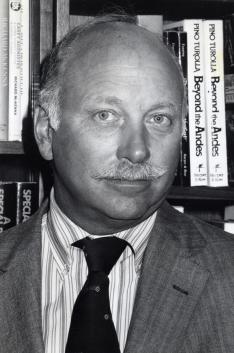Note: The following is an expanded version of a memorial published in the Feb. 8, 2012, issue of PAW.
Buz Wyeth legendary editor at HarperCollins Publishers, who edited Old Yeller, With Malice Toward None, Paper Lion, Out of My League, and The Boys of Summer, among many other titles, died at the Preakness Health Care Center in Wayne, N.J., Sept. 25, 2011. The cause of death was Alzheimer’s disease.
Buz was born in New York City on Nov, 16, 1926. He attended the Allen Stevenson School in New York before his family moved to Palm Beach, Fla., during the Depression. There, his father, Marion Sims Wyeth Sr., established Wyeth & King, a successful architecture firm, which later became Wyeth, King, and Johnson.
Buz continued his education at Palm Beach Private School, and St. Paul’s School in Concord, N.H. He entered Princeton in the fall of 1944, trained as a Navy pilot at Duke University, and, when the war ended, was discharged from the military while still in training. He graduated from Princeton with the Class of 1948.
He began his career as a salesman in a Doubleday bookstore. Hired by Macmillan as a salesman in the northeast territory, and then by Harper & Bros. as a representative along the same route, he ascended to the editorial staff at HarperCollins. He was soon working with writers such as George Plimpton, Richard McKenna, and Ursula Le Guin.
He was the editor of a book by Fred Gipson, which came to him with the title Big Yellow Dog. Buz smartly re-named it Old Yeller. He also loved to tell the story of how he turned down a book about a talking seagull. It then became a best seller: Jonathan Livingston Seagull.
Buz acquired and edited an eclectic variety of titles during his career. Two Pulitzer Prize winners — Edith Wharton: A Biography (1975) by R.W.B. Lewis and The Life and Times of Cotton Mather (1984) by Kenneth Silverman — head the list, but the other titles, with award winners and best sellers among them, reflect his personal passions for history and sports.
Among the historical authors he worked with are Geoffrey Ward, whose book, A First-Class Temperament, about Franklin Roosevelt, came out in the summer of 1989; Sterling Seagrave, who authored The Soong Dynasty; and Stephen Oates, who wrote the Lincoln biography With Malice Toward None and the Martin Luther King biography Let the Trumpet Sound.
As for sports, Buz edited Roger Kahn’s The Boys of Summer (1972), Jim Brosnan’s The Long Season (1960), William Zinsser ’44’s Spring Training (1989), and George Plimpton’s The Paper Lion (1966), among others.
“[Buz is] a soft-spoken, low-key guy, more a friend than an editor — I wrote my best books under his tutelage,” said Plimpton, who left Harper after being asked to return a $1,000 advance. “I bet Buzz fought [the advance] tooth and nail, but it soured me [on Harper].”
Other categories on Wyeth’s list include distinguished fiction (by authors ranging from Wright Morris to Ursula LeGuin), works of personal vision (by Annie Dillard Zinsser and Barbara Gordon) and a surprising collection of New Age books — from The Secret Life of Plants (1973) and Secrets of the Soil (1989), both by Peter Tompkins and Christopher Bird, to Linda Goodman’s Love Signs (1978), a book that broke the record for reprint rights at the time with a price of $2 million plus.
Other publishing milestones include The Sand Pebbles (1962) by Richard McKenna, whose bestselling novel became a movie starring Steve McQueen; Intern (1965) by Dr. X, the true account of author Alan Nourse’s year as a medical intern in an unnamed hospital, which drew a record amount for reprint rights at the time; and the dubious distinction of having rejected inspirational blockbuster Jonathan Livingston Seagull even after doing two earlier books with Richard Bach.
Zinsser penned this friendly tribute to Buz on the occasion of his 35th anniversary at HarperCollins:
When the writer’s talent drieth,
Peters out and petrifyeth,
When Ol’ Writer’s Block denyeth
Inspiration and he sigheth,
Sleepeth late and alibieth,
Moaneth low and me-oh-myeth,
Whimpereth and why-oh-whyeth,
Lieth down and like-to-dieth,
David Daunted by Goliath,
Then whose wisdom most applyeth
When the gadding muse gadflyeth?
Where’s the balm that satisfyeth?
What’s the Buz word that he cryeth?
“Let me die — or get my Wyeth!”
Buz cherished the works of A.A. Milne, which he read to his children repeatedly. According to his daughter, Ellie, he never failed to cry when he reached the passage in Winnie the Pooh when Christopher Robin has to leave the Hundred Acre Wood.
In the Nov. 28, 2005, edition of Publishers Weekly, Jim Fox, general counsel at HarperCollins, shared a story about Buz:
"In those years, there was a young woman who worked at Harper's who was, shall we say, very voluptuous. And, shall we say, she did not hide her light under a bushel." It was a hot summer day, he recalls. "Let's say, delicately, that a fair amount of her anatomy was on display as she came up the stairs," Fox continues. "She says, in this Marilyn Monroe/kewpie doll voice [Fox imitates the voice, thoroughly enjoying the moment], 'Hi Buzzie, how are you?' We get to the bottom of the stairs, and Buz grabbed the banister, and he grabbed me and he said, 'You know, whenever I see her, I don't know what's gonna happen first: Are they gonna fall out? Or am I gonna fall in?'
Buz is survived by his wife of 63 years, Nancy Coffin Wyeth, of Katonah, N.Y.; his sister, Alice Wyeth Barkhausen of Lake Forest, Ill.; his son, Marion Sims Wyeth III and daughter-in-law Sharon Dennis Wyeth of Montclair, N.J.; his daughter, Eleanor Wyeth, of Hopewell, N.J.; and six grandchildren: Samuel Wyeth Fox, Lucas Fuller Fox, Avery Sims Fox, Georgia Sims Wyeth, Lewis Wyeth Kirk, and Nancy Wyeth Kirk. His daughter, Lisa Wyeth Kirk, predeceased him.

